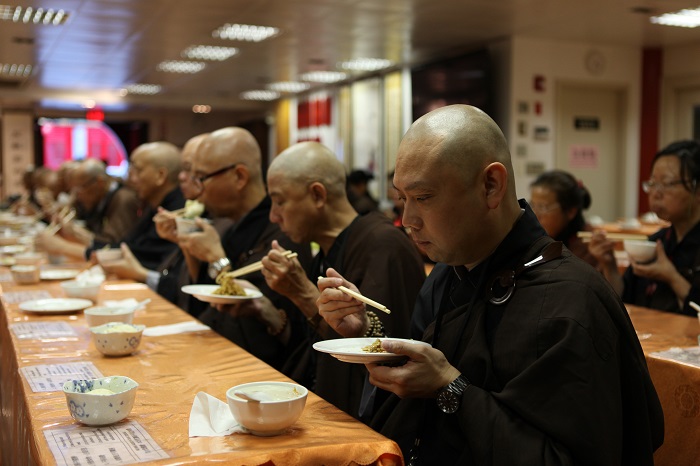Translated By Andrew Yang
A young friend believes that believing in Buddhism and following a vegetarian diet are things for the elderly to do. Young people, having a long way to go, do not need any religious faith, he thought. And as long as they work hard, with luck they will certainly acquire status, fame and fortune. He also assumes that vegetarianism is just a rule for some religion, and inasmuch as one is kind-hearted and do plenty of good, why bother about being a vegetarian?
Gentle readers, it is true that as long as young people are willing to work hard and strive to improve themselves, they may indeed have a bright future. But, when we look at it from another angle, do wealth, reputation and social standing encompass all our lives? If they do, then why are there those who have achieved brilliance in business, politics, and academia and yet are still unhappy and often feel depressed? It stands to reason that measuring the meaning and value of life by renown, rank or riches one has achieved is indeed illusory. The moment when you are obsessed with greed, the lure of possible satisfaction may make you lose your mind by taking risks to commit wanton villainy. It is important to note that karmic retribution would not wrong by even an iota. When you have to bear the consequence of evil acts, it will be too late to feel remorse and repent.
As well, let us approach the topic from a philosophical point of view. Human life does not only focus on clothing, food, shelter and transportation, nor fame, fortune and status. Because in addition to material comforts and prestige, there is spiritual life that is indispensable. We should try to embody the value of life in the daily mundane, experience the truth of life, and be liberated from the shackles of birth, sickness, ageing and death. At the same time, we must also work hard and keep learning to improve our life so as to elevate our spirituality. Young people who just step into society are opening a new chapter in their life. Will the journey ahead be a long and smooth sailing? We wonder because if the journey of life is meant to be typically unimpeded and effortless, then how could one reconcile with the fact that everywhere in the world there are frustration, grievance and joy mixed with pain and sorrow?
Buddhism says life as just between two breaths. Once the breathing stops, one’s life becomes a world apart. There is no age requirement for sickness or death in life’s eight types of suffering. For young people, death may indeed seem far away. However, lifespan being unpredictable, youths do not necessarily outlive elderly people. Thus warn our forefathers, “Do not wait to learn the dharma till one is old. The lonely graves are filled with those who die young.” Time, like flowing water, does not stop, and from cradle to grave there are but a mere few decades. That, in terms of space and time, is a fleeting moment, and further, life is nothing but a variant combination of birth, sickness, old age and death in addition to joy, sorrow, union and separation. This vista is not a pessimistic one, but purely a fact of life.
As for his view on vegetarianism, this young man may have a point. The purpose of cultivation is to cultivate the mind, and so long as one has a compassionate heart, why does he need to be vegetarian? On the other hand, however, at the moment of satisfying his transitory appetite for meat, one may actually be contributing to the taking of lives. And if so, may I ask, is this kind of behaviour compassionate in any way?
In fact, one’s diet is just a habitual behaviour, and once established, it becomes his second nature. People who take meat regularly think that eating chicken, duck, fish, seafood or game meat is such a delicacy. In contrast, vegetarians regard edible meat as part of animal carcasses, something they do their best to avoid seeing, let alone eat simply to satisfy one’s taste buds.
It is also true that ideas about things in the world and ways to cope vary with people, owing to different standpoints and perspectives. Nonetheless, it is compassion that Buddhism advocates, and the very first step to nurturing that is, naturally, being a vegetarian.

